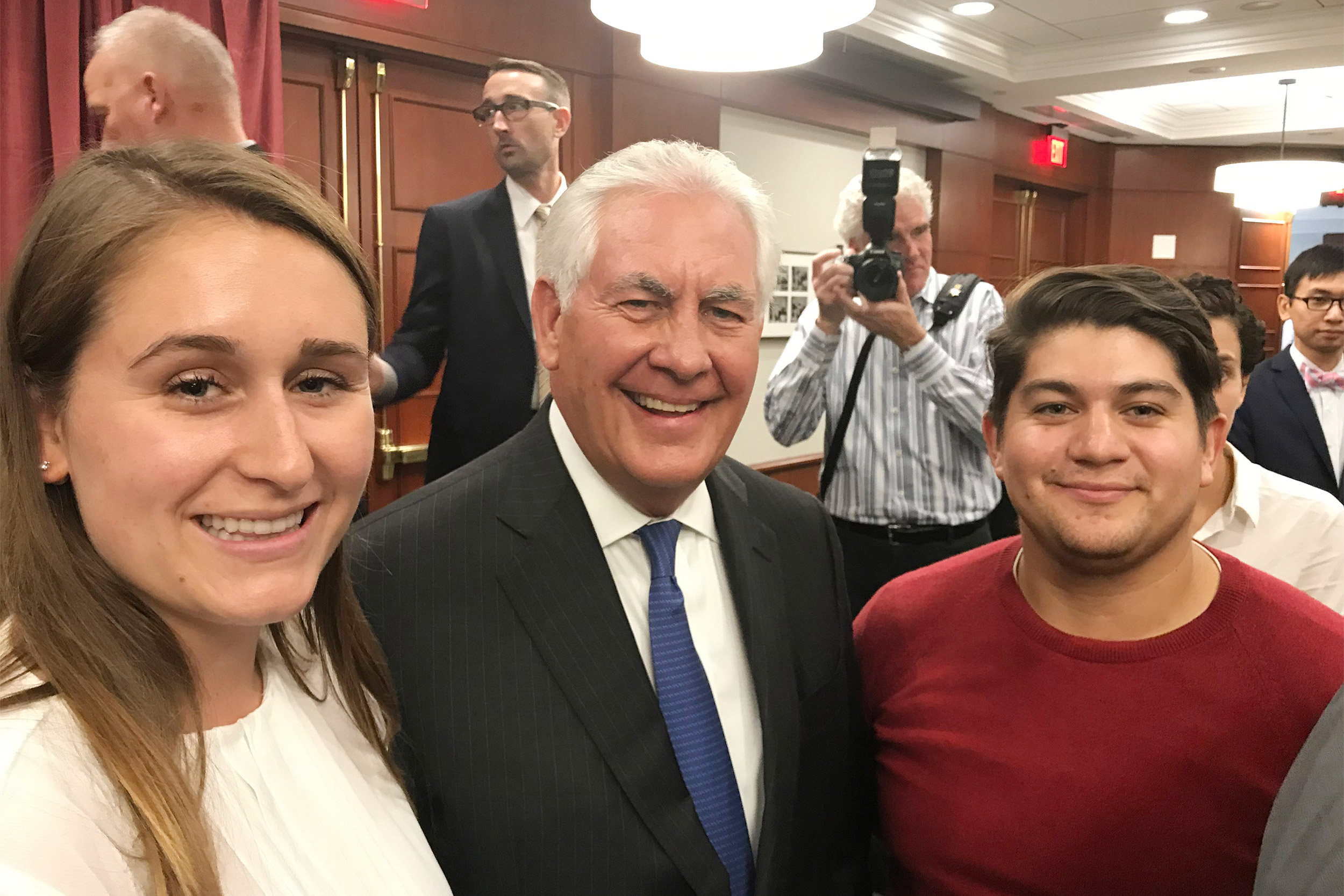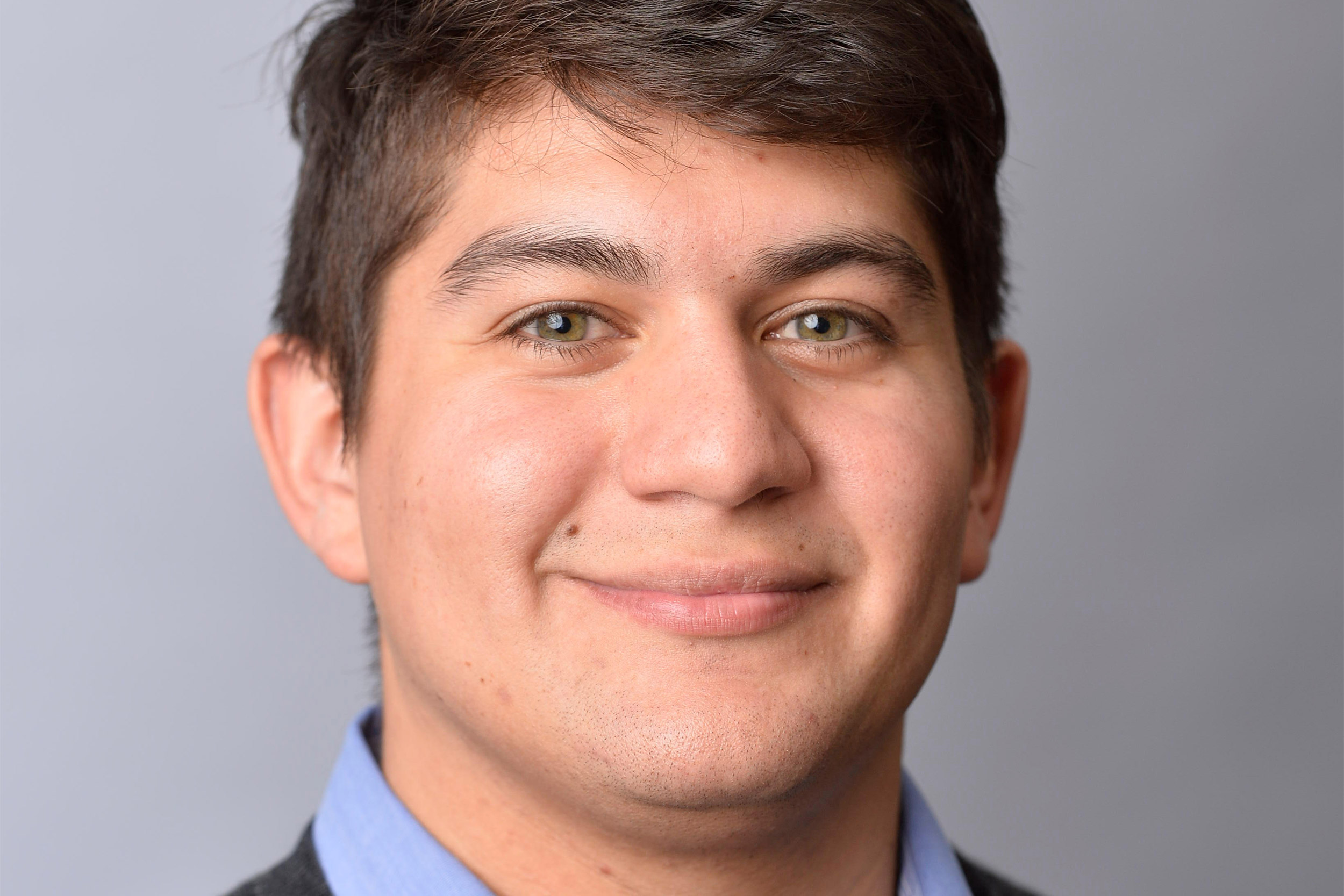
Hainer Sibrian, M.P.P. ’20, (right) was able to attend Harvard Kennedy School through a Thomas R. Pickering Fellowship, which prepares students for U.S. Foreign Service careers. He is pictured with former U.S. Secretary of State Rex Tillerson and Tufts’ Pickering Fellow Nicole Bermudez.
Photos courtesy of Hainer Sibrian
Echoes of El Salvador in Egypt
The son of Latin American immigrants, Hainer Sibrian, M.P.P. ’20, is set to launch a career as a U.S. diplomat, inspired by study abroad during Arab Spring
This is one in a series of profiles showcasing some of Harvard’s stellar graduates.
Hainer Sibrian’s desire for a career as a U.S. diplomat was ignited while studying in Egypt during the Arab Spring, where he recognized the same democratic ambitions and thwarted dreams that had gripped the El Salvador his father fled in the 1980s.
“A lot of what I understand about the world is shaped through the perspective of the Salvadoran Civil War and my father’s experience in it,” he said.
Sibrian, M.P.P. ’20, described his parents’ early struggles in the United States. After arriving from El Salvador, his father was undocumented in Los Angeles, living in a car with his cousin. When Sibrian and his siblings were young, his mother, an immigrant from Mexico, cleaned offices and hotels in East L.A.
Eventually, his father moved the family to the Atlanta suburbs so he could take a job installing hardwood floors, which he built into a successful business. But Sibrian was always aware of his family’s minority immigrant status, and he increasingly focused on issues of inequality and opportunity, at home and in the world.
After Sibrian’s ROTC scholarship to Tulane University was upended during his freshman year by the federal budget sequester, he returned home and enrolled at Georgia State University. During his senior year in 2012, he landed a scholarship to study a foreign language abroad in 2012. He chose the American University of Cairo.
“I chose to study Arabic because I was seeing U.S. policy in the region taking on a character that seemed to mirror in a lot of ways the actions that were taking place in Latin America in the 1980s,” he said.
Sibrian saw the Middle East as a region “consistently regarded as expendable by the powers that be, in particular by the United States, where the focus was almost entirely counterterrorism.” And he concluded that “the costs to the populations in Iraq and Egypt were not going to be different from what was going on in Latin America.”


“My laptop and planner, which got me through each day at HKS,” wrote Hainer Sibrian.
The Egyptian experience prompted Sibrian to pursue jobs in international democracy promotion in Washington. He worked for The Project on Middle East Democracy, which supports strengthening voices that promote democratic principles in the region. He moved on to a job with the National Endowment for Democracy, a bipartisan nonprofit that provides international grants funded by Congress through the State Department. As a State Department contractor, he managed multimillion-dollar funding, including the entire European assistance portfolio.
Sibrian says he realized that he needed to combine his passion for fostering democratic change in the world with skills in project management and negotiation, so that he could deliver results for people.
He made his way to the Kennedy School (HKS) in 2018 through a Thomas R. Pickering Fellowship, which prepares students for U.S. Foreign Service careers. He will be commissioned this fall as a foreign service officer in the State Department.
“I hope to have conversations as a political officer with country counterparts that help uphold the scaffolding of liberal democracy,” Sibrian says. “It doesn’t necessarily have to be everything they want, but just getting them to a place where the people feel represented, heard, and feel that they live in a system that is just.”
Sibrian cites a formative lesson from his adolescent years in Atlanta, when he took part in Christian athlete fellowship programs, in the prayer of St. Francis. “We shouldn’t seek to be understood, but more so to understand.”




